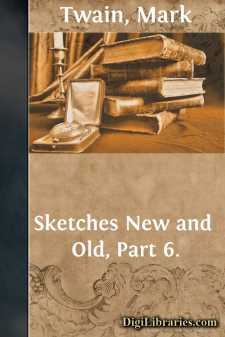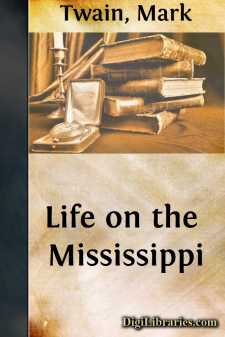Categories
- Antiques & Collectibles 13
- Architecture 36
- Art 48
- Bibles 22
- Biography & Autobiography 813
- Body, Mind & Spirit 142
- Business & Economics 28
- Children's Books 17
- Children's Fiction 14
- Computers 4
- Cooking 94
- Crafts & Hobbies 4
- Drama 346
- Education 46
- Family & Relationships 57
- Fiction 11829
- Games 19
- Gardening 17
- Health & Fitness 34
- History 1377
- House & Home 1
- Humor 147
- Juvenile Fiction 1873
- Juvenile Nonfiction 202
- Language Arts & Disciplines 88
- Law 16
- Literary Collections 686
- Literary Criticism 179
- Mathematics 13
- Medical 41
- Music 40
- Nature 179
- Non-Classifiable 1768
- Performing Arts 7
- Periodicals 1453
- Philosophy 64
- Photography 2
- Poetry 896
- Political Science 203
- Psychology 42
- Reference 154
- Religion 513
- Science 126
- Self-Help 84
- Social Science 81
- Sports & Recreation 34
- Study Aids 3
- Technology & Engineering 59
- Transportation 23
- Travel 463
- True Crime 29
Mark Twain
Mark Twain, born Samuel Langhorne Clemens in 1835, was a prominent American author and humorist known for his sharp wit and keen observations on human nature. He gained fame for his classic novels "The Adventures of Tom Sawyer" and "Adventures of Huckleberry Finn," which are celebrated for their vivid depictions of life along the Mississippi River and their incisive commentary on social issues. Twain's storytelling prowess and his ability to blend humor with critical social commentary have solidified his place as one of the most influential figures in American literature.
Author's Books:
Sort by:
by:
Mark Twain
CHAPTER XXVIII. Whatever may have been the language of Harry's letter to the Colonel, the information it conveyed was condensed or expanded, one or the other, from the following episode of his visit to New York: He called, with official importance in his mien, at No.— Wall street, where a great gilt sign betokened the presence of the head-quarters of the "Columbus River Slack-Water...
more...
by:
Mark Twain
Chapter 1 It was in 1590—winter. Austria was far away from the world, and asleep; it was still the Middle Ages in Austria, and promised to remain so forever. Some even set it away back centuries upon centuries and said that by the mental and spiritual clock it was still the Age of Belief in Austria. But they meant it as a compliment, not a slur, and it was so taken, and we were all proud of it. I...
more...
by:
Mark Twain
"MORAL STATISTICIAN."—I don't want any of your statistics; I took your whole batch and lit my pipe with it. I hate your kind of people. You are always ciphering out how much a man's health is injured, and how much his intellect is impaired, and how many pitiful dollars and cents he wastes in the course of ninety-two years' indulgence in the fatal practice of smoking; and in the...
more...
by:
Mark Twain
CHAPTER XLVI. Philip left the capitol and walked up Pennsylvania Avenue in company with Senator Dilworthy. It was a bright spring morning, the air was soft and inspiring; in the deepening wayside green, the pink flush of the blossoming peach trees, the soft suffusion on the heights of Arlington, and the breath of the warm south wind was apparent, the annual miracle of the resurrection of the earth. The...
more...
by:
Mark Twain
"Now that corpse," said the undertaker, patting the folded hands of deceased approvingly, was a brick-every way you took him he was a brick. He was so real accommodating, and so modest-like and simple in his last moments. Friends wanted metallic burial-case—nothing else would do. I couldn't get it. There warn't going to be time—anybody could see that. "Corpse said never mind,...
more...
by:
Mark Twain
The following curious history was related to me by a chance railway acquaintance. He was a gentleman more than seventy years of age, and his thoroughly good and gentle face and earnest and sincere manner imprinted the unmistakable stamp of truth upon every statement which fell from his lips. He said: You know in what reverence the royal white elephant of Siam is held by the people of that country. You...
more...
by:
Mark Twain
THE 'BODY OF THE NATION' BUT the basin of the Mississippi is the BODY OF THE NATION. All the other parts are but members, important in themselves, yet more important in their relations to this. Exclusive of the Lake basin and of 300,000 square miles in Texas and New Mexico, which in many aspects form a part of it, this basin contains about 1,250,000 square miles. In extent it is the second...
more...
by:
Mark Twain
CHAPTER LXXI. At four o'clock in the afternoon we were winding down a mountain of dreary and desolate lava to the sea, and closing our pleasant land journey. This lava is the accumulation of ages; one torrent of fire after another has rolled down here in old times, and built up the island structure higher and higher. Underneath, it is honey-combed with caves; it would be of no use to dig wells in...
more...
by:
Mark Twain
WHAT IS MAN? I a. Man the Machine. b. Personal Merit (The Old Man and the Young Man had been conversing. The Old Man had asserted that the human being is merely a machine, and nothing more. The Young Man objected, and asked him to go into particulars and furnish his reasons for his position.) Old Man. What are the materials of which a steam-engine is made? Young Man. Iron, steel, brass, white-metal,...
more...
by:
Mark Twain
CHAPTER I. My brother had just been appointed Secretary of Nevada Territory—an office of such majesty that it concentrated in itself the duties and dignities of Treasurer, Comptroller, Secretary of State, and Acting Governor in the Governor's absence. A salary of eighteen hundred dollars a year and the title of "Mr. Secretary," gave to the great position an air of wild and imposing...
more...











